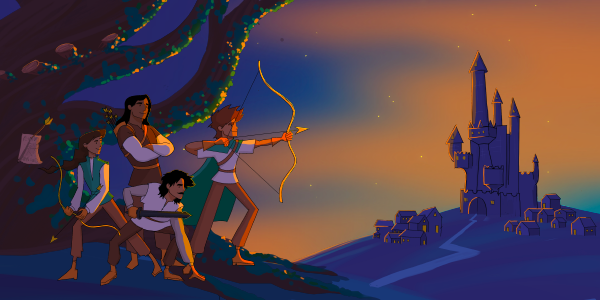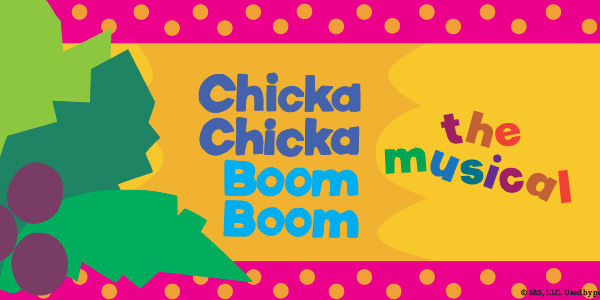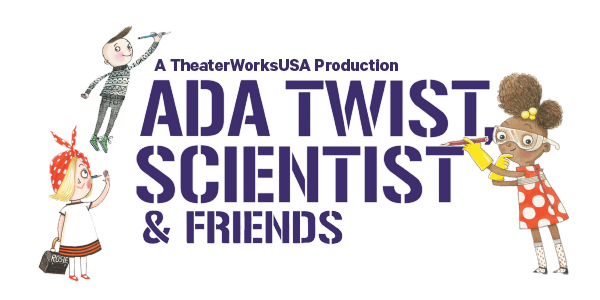Content Guidance
At Seattle Children’s Theatre (SCT), we believe theatre is most powerful when it sparks conversation. For more than 50 years, SCT has been dedicated to artistic expression, family theatre, and community engagement, creating performances that resonate with audiences of all ages.
This Content Guidance page is designed to help caregivers, families, and educators prepare for their theatre experience. Here you’ll find insights that encourage meaningful discussions with young people before and after the show, supporting both classroom learning and at-home reflection. Our goal is to ensure every audience member feels informed, comfortable, and inspired as they engage with SCT productions.
25-26 SEASON
Young Dragon: A Bruce Lee Story
February 19 - March 29, 2026
Learn more about this production in the drop-down items below.
This vibrant play takes audiences on a surreal journey through Bruce Lee’s life, blending high-energy action and stylized fights with humor, heart, and vulnerability. Through playful storytelling and poignant moments with characters like Linda and the quirky Guides, we see Bruce as a dreamer, fighter, husband, and cultural bridge. Fast-paced and deeply human, Young Dragon celebrates balance, resilience, and Bruce’s timeless lesson to “be like water.”
Discipline
Bruce’s journey shows that true discipline comes from staying driven in our dreams and devoted to those we love.
Self-Discovery
Bruce’s journey of self-discovery reminds us that when we find who we are and who we want to be, our possibilities become limitless.
Resiliency
Bruce’s struggles and triumphs show that resilience through hardship can transform challenges into strength.
Values
Bruce’s journey reveals how values can create conflict but also inspire love, joy, and a deeper connection to ourselves and others.
- Contains brief references to physical conflict (no graphic detail)
- Includes thoughtful discussions of racial profiling and discrimination
- Explores themes of cultural identity and belonging
- Features stylized, choreographed fight scenes (theatrical, not graphic)
- Some scenes depict characters getting injured
- Includes moments where Bruce is shown in the hospital
This play traces Bruce Lee’s life through cinematic action and heartfelt storytelling, revealing the man behind the legend. From his childhood in Hong Kong to starting anew in Seattle, falling in love with Linda, and challenging traditions with his teaching, Bruce confronts rejection, injury, and cultural identity. Through resilience and his philosophy to “be like water,” he rises to iconic status—celebrated not just as a star, but as a deeply human figure.
Robin Hood
March 26 - May 10, 2026
Content Note: COMING SOON
Learn more about this production in the drop-down items below. Our sensory guide for Robin Hood is coming soon.
The show sweeps the audience into Robin Hood’s world of hunger, injustice, and defiance, brought to life through music, movement, and thrilling physical storytelling. Chase scenes, sword fights, disguises, and dances energize the legend, while Robin’s arrival unites a band of outlaws into a found family. Marian’s struggle between loyalty and justice adds depth, her choice to join the rebellion highlighting the play’s core message: community over control, and freedom over fear. With moments of laughter, love, sacrifice, and triumph, the story builds to a bittersweet finale—leaving the audience with hope, resilience, and the reminder that even one arrow can spark a revolution.
Community
In the play, Marian’s journey shows how true community—whether inherited or found—offers strength, belonging, and the power to stand together against injustice.
Standing Up and Speaking Up
Robin Hood shows that even when it’s difficult or frightening, using our voice and courage to stand for what’s right can lead to justice.
Responsibility
In Robin Hood, the different choices of Robin, the Sheriff, and Marian reveal the many layers of responsibility—and how acting on them can bring both justice and consequence.
Justice
In Robin Hood, the clash between what is “right” and what is “just” reminds us to look beyond the rules, recognize true justice, and challenge systems that prey on the vulnerable.
Heroism
In Robin Hood, we see that heroism isn’t just Robin’s—it lives in everyone, from Marian’s defiance to Much’s bravery to the Friar’s selflessness, reminding us of our own power to be heroes.
- Contains some mature language, including references to violence, execution, forced marriage, and death
- Includes the word “ass” (used in a Shakespearean context)
- Most language is delivered as comedic quips, highlighting character absurdity rather than realism
- Features stylized fight scenes and instances of onstage violence
- Includes depictions of two character deaths
- Uses stage weapons and occasional audience interaction
The play opens with street musicians and beggars painting the struggles of life under Prince John’s rule, as the legend of Robin Hood begins to unfold. When a beggar is killed for protecting Robin, his son Much joins the band of merrymen, who take from the rich to give to the poor. Together, they pull off daring rescues, including freeing Will from execution with the help of the audience, and outwit the Sheriff through disguises, sword fights, and clever schemes. Marian, torn between loyalty to her father and the injustice around her, chooses to defy Prince John and join Robin’s cause, proving her own wit and courage. Along the way, Robin recruits allies like Little John, while the Sheriff continues to set traps—from forced marriage to a rigged archery contest. In the climactic showdown, Robin defeats the Sheriff but is mortally wounded. As King Richard dies and Prince John seizes power, Robin sacrifices himself so his band can escape. The beggars close the tale by honoring his legacy, reminding us that Robin’s spirit lives on in the call for justice, courage, and hope.
Billy Goats Gruff and Other Tales
April 23 - May 17, 2026
Content Note: COMING SOON
Learn more about this production in the drop-down items below. Our sensory guide for Billy Goats Gruff and Other Tales is coming soon.
Set in a silly, enchanted land, Billy Goats Gruff and Other Tales follows a treasure-hunting Raccoon and a curious Mouse who become fast friends. Guided through classic storybook adventures, their chaotic encounters bring comedy, warmth, and the reminder that life’s greatest treasures are friendship, family, and community.
Repetition
The play shows how repetition—saying or doing something more than once—helps others better understand what we mean.
Rhyming
The play’s Narrator uses rhyming to tell the story, showing how words that sound alike can make storytelling more fun and engaging.
Friendship
The play reminds us that while friends are special people we choose, sometimes the best ones find us when we least expect it.
- Includes scenes of house fires, tornados, and falls from great heights
- All moments are presented in a silly, humorous, non-scary way
In a silly, enchanted land where nothing ever happens, a treasure-hunting Raccoon meets a curious Mouse, and the two set off on a series of misadventures. From putting out a porridge fire in the Bear family’s home to startling the Three Pigs during a storm and even saving a goat at a bridge, their antics create mix-ups at every turn. Mistaken for Goldilocks, the Big Bad Wolf, and a troll, the duo leaves the village buzzing with hilarious misunderstandings. Full of laughter, adventure, and heart, the play reminds us that the best treasures are often the friends we find along the way.
Chicka Chicka Boom Boom: The Musical
September 18 - October 12, 2025
This production is in the past.
Learn more about this production in the drop-down items below.
Chicka Chicka Boom Boom: The Musical reimagines the beloved children’s book in a vibrant, interactive performance. The play opens with a silly sequence of suitcase surprises, forming words that both actors and audiences can play with. Through songs and colorful staging, the alphabet scrambles up the tree—everyone except Little z. As the audience waits in suspense, z finally climbs, only to tumble down with the rest. The Big Letters arrive in a humorous tune to set things right, and the show ends in a dazzling finale of letters climbing again beneath a painted sunset and rising moon. With audience interaction, lively performances, and a spectacular finale, this musical is a joyful celebration of sound, rhythm, and reading.
Self-Confidence
Like the alphabet, each of us is unique. Little z struggles to find belonging but ultimately learns that everyone has value and a place.
Social and Emotional Learning
The letters grow by engaging with each other, voicing feelings, and learning from both successes and failures—showing the power of emotions in learning and connection.
Literacy
A love letter to reading and writing, the show personifies the alphabet to make literacy playful, immersive, and imaginative.
Problem-Solving
Each letter wants to reach the top of the tree but must figure out how. Through trial and error, they show audiences the power of persistence and creative problem-solving.
- The play depicts moments where a character is left out, though not framed as bullying.
- Unsafe behaviors lead to comedic, satirical portrayals of injury through costumes and staging.
- High levels of audience engagement throughout.
- Amplified music throughout the performance.
- Use of bright lights that change quickly and moments when the lights come up in the audience.
In Chicka Chicka Boom Boom: The Musical, the alphabet bursts to life in a playful, music-filled adventure. With costumes, puppets, and lively songs, the letters scramble up a towering coconut tree—until it becomes too crowded and comes crashing down in one big “BOOM!” Amid the chaos, Little z struggles to find their place, always arriving last and left behind. With the help of the Big Letters and a heartwarming finale, z learns that everyone has value and a place to belong. Full of audience participation, rhythm, and surprises, this joyful adaptation of the beloved children’s book is a celebration of music, literacy, and the power of community.
The Pigeon Gets A Big Time Holiday Extravaganza!
November 20 - January 4, 2026
This production is in the past.
Learn more about this production in the drop-down items below.
Playful, high-energy, and hilariously chaotic, with moments of warmth and sincerity. The production balances witty comedy, zany characters, and audience interaction with heartfelt lessons about generosity, friendship, and the true meaning of the season.
You Are a Gift
The story emphasizes that self-worth and presence matter more than material gifts.
Friendship
Gerald and Piggie’s imperfect gifts highlight that love and care are more valuable than perfection.
Learning & Embracing Your Own Gifts
Each character discovers unique strengths, showing the importance of recognizing personal value.
Collaboration
The squirrels’ over-the-top party planning reveals the power (and pitfalls) of teamwork.
- The Pigeon uses playful, sassy language—silly and dramatic without becoming mean-spirited.
- Songs and dialogue lean into clever, comedic wordplay while keeping it accessible for young audiences.
- Mild depictions of bad behavior (Pigeon’s sass, impatience, entitlement).
- Scenes of anxiety and disappointment, especially around gift-giving.
- Santa’s Sleigh & North Pole references—light illusions to Christmas.
- Frequent audience interaction—breaking the fourth wall, call-and-response, and direct engagement.
In The Pigeon Gets a Big Time Holiday Extravaganza, Zoomy and a team of squirrels prepare an over-the-top holiday party, joined by Gerald and Piggie. The Pigeon wants nothing to do with it—until he hears about presents. As Gerald and Piggie secretly exchange gifts, they worry theirs aren’t “perfect,” leading to comedic musical numbers and heartfelt moments. Meanwhile, The Pigeon storms off on a frantic quest for presents, even mistaking Santa’s sleigh for his own. The squirrels’ party planning spirals out of control until they learn that “something” is better than “everything.” In the end, Gerald and Piggie’s mismatched hats bring joy, and their kindness extends to The Pigeon, who finally receives a “gift” in friendship. The show closes with a lively, heartwarming finale celebrating presence over presents—the reminder that the best gift is time spent together.
Ada Twist, Scientist and Friends
January 22 - February 22, 2026
This production is in the past.
Learn more about this production in the drop-down items below. Our sensory guide for Ada Twist, Scientist & Friends is coming soon.
This heartwarming musical follows Ada, Iggy, and Rosie through the ups and downs of second grade—from first-day chaos to triumphs in building bridges, both real and emotional. Audiences will laugh at classroom mayhem, root for a struggling teacher, and cheer as the kids discover courage, friendship, and their own voices. In the end, students and teacher alike learn that curiosity, kindness, and working together are the true foundations of growth.
Science, Technology, and Math
This play celebrates science, technology, and math, showing that school isn’t boring—it’s where we unlock the power to understand the world and ourselves.
Teamwork
Like puzzle pieces, our unique strengths become truly powerful when we come together—this play shows the incredible things teamwork can build, both physically and emotionally.
Building Confidence
As the characters build a bridge to reconnect with each other, they also discover confidence, self-growth, and the power of connecting with themselves.
Learning and Exploring
Through curiosity and exploration, the characters discover themselves, each other, and the empowering possibilities of the world around them.
- Youth characters use a playful, exaggerated “smart talk” style
- Humor includes light, age-appropriate jokes (like stinky diapers and smelly cheese)
- Some scenes are playfully chaotic with moments of mayhem
- Features high-energy situations like a collapsing bridge or a teacher fainting
- All action is safe—no characters are ever harmed
The play begins at Blue River Creek Elementary, where Ada, Iggy, and Rosie face a chaotic first day with their overwhelmed teacher, Miss Greer. Through musical moments, each child learns lessons of confidence, empathy, and perseverance, guided by family and mentors—including Rosie’s Great Great Aunt Rose, revealed to be Rosie the Riveter. A surprise field trip leads to a stranded adventure on an unstable bridge, where the kids and Miss Greer must work together. Rosie rediscovers her engineering spark, and the team builds a suspension bridge from found materials, helping Miss Greer conquer her fears. In the end, they learn that teamwork, courage, and curiosity can build bridges both real and metaphorical, closing with a song celebrating growth and connection.
Have more questions?
Please reach out to hello@sct.org and we'll get back to you soon.







